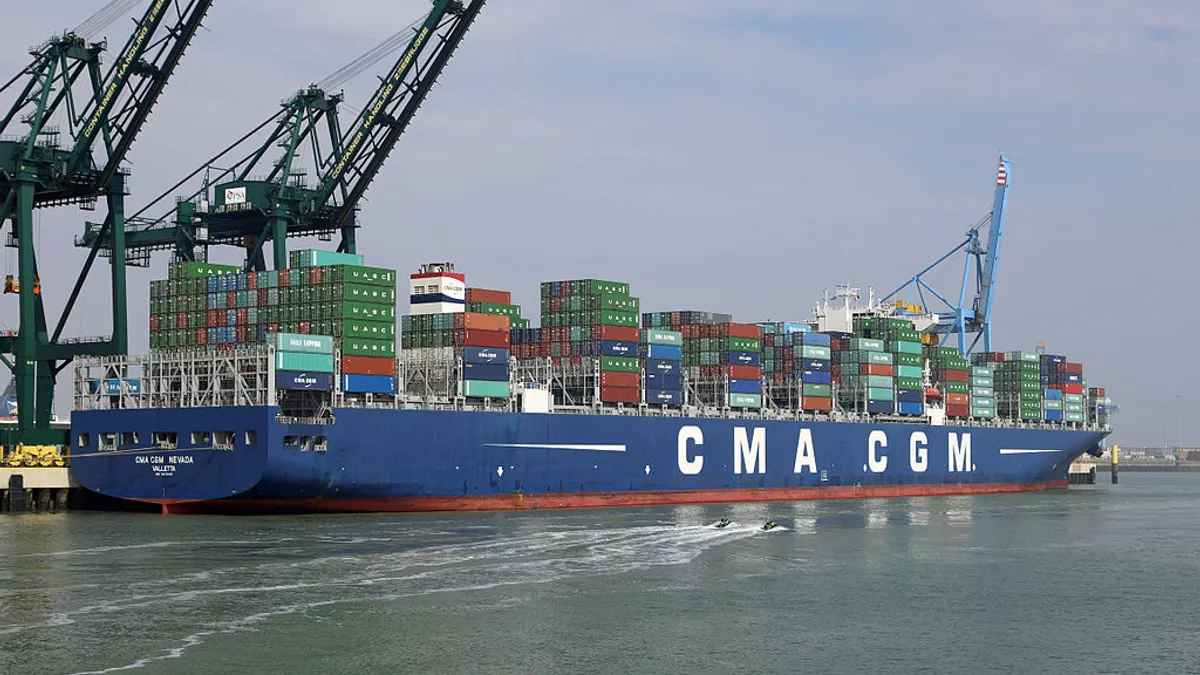UPDATE: November 1, 2018: CMA CGM announced the European Commission authorized its purchase of Containerships. The approval sets into motion another piece of the puzzle in CMA CGM's plan to bolster its service by providing a more dense, regional offering.
Dive Brief:
- CMA CGM will buy Containerships — a European intra-regional transportation provider — along with stake in Multi-Link Terminals and CD Holding from Finnish seller Container Finance.
- The acquisition is "aimed at densifying the Group's regional network," according to CMA CGM's statement. Containerships will join CMA CGM's MacAndrews line as a Europe-focused subsidiary and complement similar services like the liner's Brazil (Mercosul) and Intra Asia (CNC) subsidiaries.
- In addition to Northern Europe, Containerships has a presence in the Baltic market, Russia, North Africa and Turkey, according to its website. The purchase will also help improve CMA CGM's shoreside services, thanks to a network of 23 ports of call.
Dive Insight:
CMA CGM may be leading the charge in a second wave of shipping industry consolidation.
So far in 2018, CMA CGM has been very active on the acquisition trail. In addition to Containerships, the company also bought a 25% stake in CEVA Logistics in April.
The two purchases have clear benefits to CMA CGM: The carrier now has a stronger foothold in intra-regional trade and, in the case of CEVA, the customs brokerage expertise to meet higher demand.
But they also reflect a renewed focus by the carrier to use its capital to buy service-oriented logistics providers rather than augmenting its shipping capacity. It's a new strategy CMA CGM explained to press at JOC's TPM 2018 in March: CMA CGM's top focus in 2018 and beyond will be customer service.
"Consolidation poses a challenge to all of us," said Kevin Speers, director of corporate communications, at the event. "We probably need to work on differentiation a bit differently than what we have been doing in the years before. There is an urge for us to get out of the commodity column."
As a carrier, "running around with a price tag on your back" as the only big difference shippers see among service providers, he said, "is not very fun."
It's a similar strategy to the one Maersk announced — in different terms — this February.
"We continue to believe that the liner industry will consolidate further," Maersk CEO Soren Skou wrote in a statement. As a result, the shipping line said it sought to become "the global integrator of container logistics," and in so doing, better serve the customer.
"The first (step) is to provide those simple end-to-end solutions to meet our customers' complex supply chain needs," Skou wrote. "As part of this we are planning several value-added services online to complement the physical offering, including inland services and custom house brokerage."
In other words, it's no longer just about the size of the ships, fleet or the number of trades each carrier owns. This year, it's about finding ways to differentiate the product for shippers. A dense regional network, where CMA CGM can offer end-to-end service in Europe, is one way to do that.















